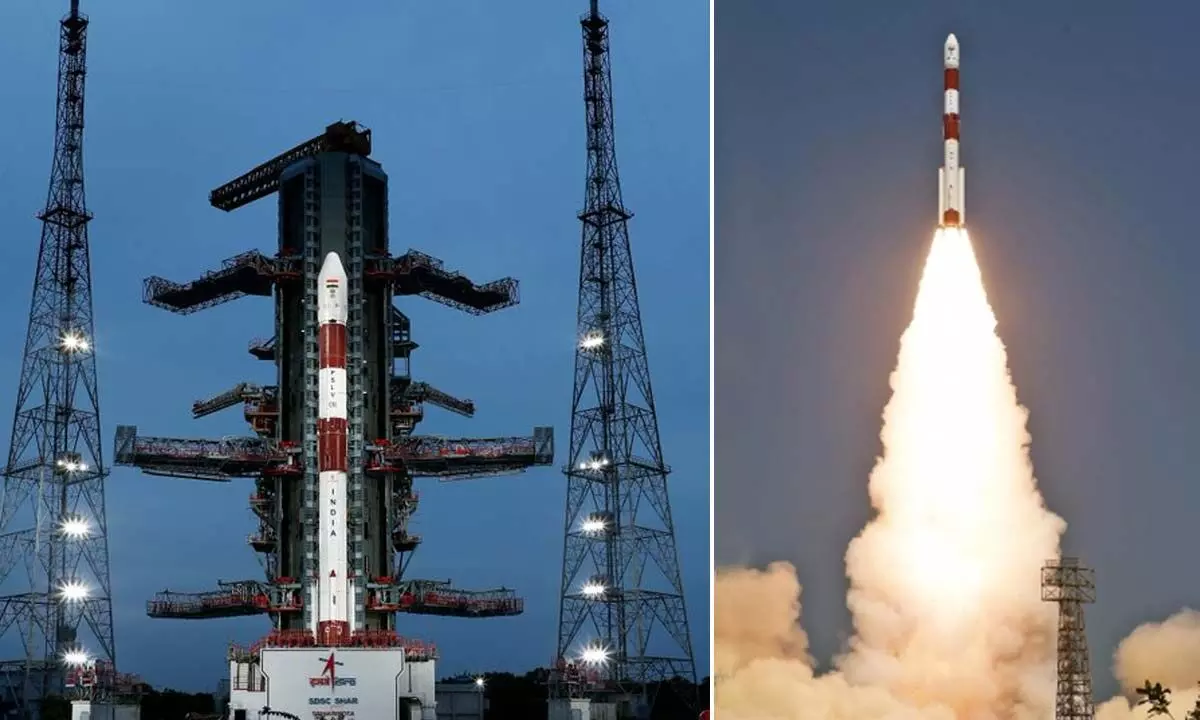India successfully places three Singaporean satellites in orbit

India successfully places three Singaporean satellites in orbit (Photo/IANS)
India on Thursday evening successfully placed into orbit three Singaporean satellites in a text book style.
Sriharikota (Andhra Pradesh): India on Thursday evening successfully placed into orbit three Singaporean satellites in a text book style.
This is the second successful rocket and satellite launch mission from here in 2022.
At 6.02 p.m., Indian rocket Polar Satellite Launch Vehicle-C53 (PSLV-C52) blasted off from the second launch pad at Satish Dhawan Space Centre (SDSC) here.
The rocket carried three satellites- the 365 kg DS-EO as its primary passenger and the 155 kg NeuSAR and the 2.8 kg Scoob-1 of Nanyang Technological University (NTU), Singapore as co-passengers.
The PSLV-C53 also carried six payloads, including two from Indian space start-ups- Digantara and Dhruva Aerospace-on its fourth stage (PS4).
The rocket's spent upper stage will be used as a stabilised platform for scientific payloads, subsequent to the separation of the satellites.
With this successful mission, the PSLV rocket has launched 345 foreign satellites belonging to 36 countries since 1999.
Congratulating Team ISRO for the successful mission, Indian Space Research Organisation (ISRO) Chairman S. Somanath said: "The PSLV C53 rocket has placed the customer satellites in precise orbit. The PS4 will write some 'POEMs' in the space."
He said the control of PS4 or the fourth and final stage of the rocket will be taken over by its systems.
Somanath said the PS4 with six payloads will carry out experiments in the space.
The PSLV-C53 is a four-stage expendable, 44.4 m tall rocket with a lift-off mass of about 228 ton while the total weight of the three satellites is 522.8 kgd.
The four stage/engine expendable rocket os powered by solid (first and third stages) and liquid (second and fourth stages) fuels alternatively.
The rocket that flew on Thursday was the 55th mission of PSLV and 15th mission using the PSLV-Core Alone variant.
In its normal configuration, the PSLV rocket will have six strap-on booster motors hugging its first stage.
In the Core Alone variant of PSLV, the six strap-on motors will not be there as the payload weight is less.
The Indian space agency has PSLV variants PSLV-DL with two, PSLV-QL with four strap-on motors, and PSLV-XL with bigger booster motors.
The choice of the rocket to be used depends on the weight of the satellite and the orbit where the satellite has to be orbited.
According to the ISRO, the DS-EO satellite carries an electro-Optic, multi-spectral payload that will provide full colour images for land classification, and serve Humanitarian Assistance and Disaster Relief needs.
The NeuSAR is Singapore's first small commercial satellite carrying a synthetic aperture radar (SAR) payload, which is capable of providing images in day and night and under all weather conditions.
On the other hand, the SCOOB-I satellite is the first satellite in the Student Satellite Series (S3-I), a hands-on student training programme from the Satellite Research Centre (SaRC) at Singapore's NTU School of Electrical and Electronic Engineering.
The ISRO said the PSLV Orbital Experimental Module (POEM) activity will perform in-orbit scientific experiments using the spent PS4 stage as an orbital platform.
It is the first time that the PS4 stage would orbit the earth as a stabilised platform. Attitude stabilization is achieved using a dedicated Navigation Guidance and Control system.
Earlier, the ISRO has conducted experiments in space using the PSLV's final stage as an orbital platform.
According to the ISRO, the POEM will be powered by the solar panels mounted around the PS4 tank and a lithium ion battery.
It navigates using four sun sensors, a magnetometer, gyros and NavIC-India's satellite navigation system.
The POEM carries dedicated control thrusters using Helium gas storage. It is enabled with the telecommand feature.
The module carries six payloads including two from Indian Space Start-ups Digantara and Dhruva Space.














